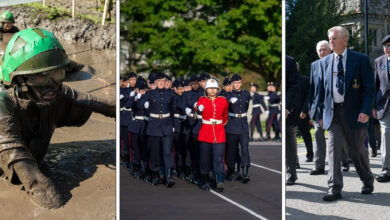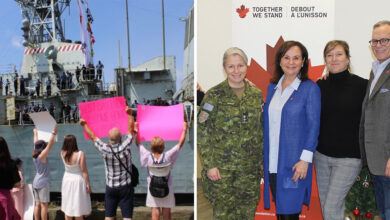Events
Trudeau announces Canada’s combat mission to end on February 22, 2016
Canada’s combat mission against the Islamic State of Iraq and Syria will come to an end on Feb.22, announced Prime Minister Justin Trudeau in a press conference on Feb. 8. Joined by Defence Minister Harjit Sajjan, Minister of Foreign Affairs, Stéphane Dion, and the Minister of International Development and La Francophonie, Marie-Claude Bibeau, Trudeau announced the CF-18s will be pulled out of the mission and the military’s focus in the region will shift to more of a “train, advise and assist effort.”
“It is important to understand that while airstrike operations can be very useful to achieve short-term military and territorial gains, they do not on their own achieve long-term stability for local communities,” said Trudeau.
Trudeau attributed this belief to lessons learned from the War in Afghanistan.
CAF troops will be tripled from 69 in northern Iraq to provide training to Iraqi forces and the overall number will increase by 230 the 600 CAF members currently deployed for the coalition mission. The focus of the troops will be to empower local security forces and working alongside the government of Iraq, including promoting diplomacy and building infrastructure. Trudeau stressed this will be a non-combative mission.
“Our new policy in Iraq, Syria and the surrounding region reflects what Canada is all about: defending our interests alongside our allies, and working constructively with local partners to build real solutions that will last. We will work with allies to defeat ISIL and the terrorist threat it represents. At the same time, we will help address the needs of millions of vulnerable people while helping lay the foundations for improved governance, economic growth and longer-term stability,” stated Trudeau.
Though Canada will no longer directly be engaged in combat against ISIS, two CP-140 Aurora surveillance aircrafts and a CC-150 Polaris refuelling aircraft will remain in the region.
The Government also pledged more than $1.6 billion over the next three years to increase security, stabilization and humanitarian assistance in the region. This includes $840 million pledged towards humanitarian aid for the refugees of Iraq and Syria and $270 million for capacity building to Jordan and Lebanon.
The military mission is a two year mission but the Government stated it will be assessed from time to time.
Trudeau stated that he had spoken to other coalition partners, including President Obama, and they are “reassured” of Canada’s commitment towards the fight against ISIS.
Trudeau acknowledged that “some” people believe that the government should use “heated, over-the-top rhetoric” when discussing ISIS. However, the Prime Minister believes that this will accomplish “precisely what our enemies want us to do: they want us to elevate them, to give in to fear, to indulge in hatred.”
Recent polls suggest that many Canadians disagree with the Liberal plan against ISIS. When asked about the unpopularity of this plan, Trudeau stressed that in the elections Canadians had chosen the party that had clearly stated they would shift the military role to non-combat one.
Believing in the “value of informed and robust debate,” Trudeau said he looks forward to bringing the new plan to debate and vote in Parliament. Parliament reconvenes on Feb.16.











